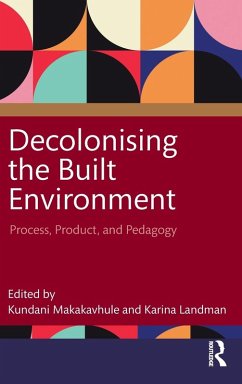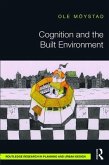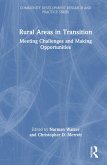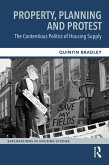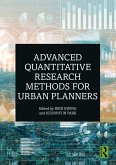Decolonising the Built Environment
Process, Product, and Pedagogy
Herausgeber: Makakavhule, Kundani; Landman, Karina
Decolonising the Built Environment
Process, Product, and Pedagogy
Herausgeber: Makakavhule, Kundani; Landman, Karina
- Gebundenes Buch
- Merkliste
- Auf die Merkliste
- Bewerten Bewerten
- Teilen
- Produkt teilen
- Produkterinnerung
- Produkterinnerung
This book provides an important and much-needed comprehensive overview of how decolonisation is shaping the built environment in theory, practice, and as a process/project today. Part one studies decolonisation conceptually; part two studies decolonisation as a process; and part three studies the products of decolonisation.
Andere Kunden interessierten sich auch für
![Cognition and the Built Environment Cognition and the Built Environment]() Ole MöystadCognition and the Built Environment180,99 €
Ole MöystadCognition and the Built Environment180,99 €![Systems Thinking for Sustainable Crime Prevention Systems Thinking for Sustainable Crime Prevention]() Vania CeccatoSystems Thinking for Sustainable Crime Prevention180,99 €
Vania CeccatoSystems Thinking for Sustainable Crime Prevention180,99 €![Rural Areas in Transition Rural Areas in Transition]() Rural Areas in Transition161,99 €
Rural Areas in Transition161,99 €![Migrant Homelessness and the Crimmigration Control System Migrant Homelessness and the Crimmigration Control System]() Regina SerpaMigrant Homelessness and the Crimmigration Control System153,99 €
Regina SerpaMigrant Homelessness and the Crimmigration Control System153,99 €![The New Century of the Metropolis The New Century of the Metropolis]() Tom AngottiThe New Century of the Metropolis219,99 €
Tom AngottiThe New Century of the Metropolis219,99 €![Property, Planning and Protest: The Contentious Politics of Housing Supply Property, Planning and Protest: The Contentious Politics of Housing Supply]() Quintin BradleyProperty, Planning and Protest: The Contentious Politics of Housing Supply157,99 €
Quintin BradleyProperty, Planning and Protest: The Contentious Politics of Housing Supply157,99 €![Advanced Quantitative Research Methods for Urban Planners Advanced Quantitative Research Methods for Urban Planners]() Advanced Quantitative Research Methods for Urban Planners151,99 €
Advanced Quantitative Research Methods for Urban Planners151,99 €-
-
-
This book provides an important and much-needed comprehensive overview of how decolonisation is shaping the built environment in theory, practice, and as a process/project today. Part one studies decolonisation conceptually; part two studies decolonisation as a process; and part three studies the products of decolonisation.
Produktdetails
- Produktdetails
- Verlag: Taylor & Francis Ltd (Sales)
- Seitenzahl: 242
- Erscheinungstermin: 7. Februar 2025
- Englisch
- Abmessung: 229mm x 152mm x 16mm
- Gewicht: 517g
- ISBN-13: 9781032352435
- ISBN-10: 1032352434
- Artikelnr.: 71618684
- Herstellerkennzeichnung
- Libri GmbH
- Europaallee 1
- 36244 Bad Hersfeld
- gpsr@libri.de
- Verlag: Taylor & Francis Ltd (Sales)
- Seitenzahl: 242
- Erscheinungstermin: 7. Februar 2025
- Englisch
- Abmessung: 229mm x 152mm x 16mm
- Gewicht: 517g
- ISBN-13: 9781032352435
- ISBN-10: 1032352434
- Artikelnr.: 71618684
- Herstellerkennzeichnung
- Libri GmbH
- Europaallee 1
- 36244 Bad Hersfeld
- gpsr@libri.de
Kundani Makakavhule is a senior lecturer in the Department of Town and Regional Planning at the University of Pretoria, specialising in the transformation of urban public open spaces at neighbourhood and precinct scales. Her research focuses on democracy, spatial appropriation, diversity, and active citizenship, exploring how these micro-scale dynamics influence broader urban planning processes. Drawing on theories from politics, sociology, and geography, her work addresses the social and political factors shaping planning in the developing world. By emphasising multidisciplinary approaches, she contributes to solving contemporary challenges in African urban spaces. Karina Landman is a professor in the Department of Town and Regional Planning at the University of Pretoria with a background in urban design and architecture. Her work focuses on spatial transformation, including research on gated communities and safer and sustainable neighbourhoods, regenerative and resilient cities, and public space. Her work on public space revolves around issues of inclusivity, regeneration, and resilience. Her research on sustainable development focuses on urban resilience and regenerative development and design. She has published a book, Evolving Public Space in South Africa (2019).
1. Towards a Decolonial Turn in the Built Environment Part 1 From Paradigm to Process 2. Performing Space: Thoughts on Colonising, Decolonising, and the Concert Hall 3. Settler Colonial Critique and Indigenous Urbanisation 4. Place-Based Indigenous Knowledge Systems and Their Relevance to the Decolonisation of Urban Planning Practice in Namibia: The Olupale and the Omuvanda: Two Cultural Open Spaces 5. Place-Based Strategies for Transforming South African Urban Nature Places 6. An African Landscape Design Approach for Rural Development Part 2 From Process to Product and Pedagogy 7. Decolonising the Built Environment in and around a University Campus: The Incongruence between Intellectual Discourse and Lived (Institutional) Practices 8. Visual Redress at Stellenbosch University: Staff Reactions to the Decolonisation of Campus Spaces 9. The Invisible Users of the Street 10. Ubuntu Design Aesthetics and the Built Environment in South Africa 11. An Inquiry into Visual Art as a Critical Disruptor to Reveal Emergent Narratives and Authorship in Architecture 12. Kam
r
th
: An Architecture for Decolonisation Part 3 Reflections on the Decolonial Turn in the Built Environment 13. Spaces of Erasure 14. Can the Master Speak? 15. Conclusion: Reconsidering the Decolonisation of the Built Environment
r
th
: An Architecture for Decolonisation Part 3 Reflections on the Decolonial Turn in the Built Environment 13. Spaces of Erasure 14. Can the Master Speak? 15. Conclusion: Reconsidering the Decolonisation of the Built Environment
1. Towards a Decolonial Turn in the Built Environment Part 1 From Paradigm to Process 2. Performing Space: Thoughts on Colonising, Decolonising, and the Concert Hall 3. Settler Colonial Critique and Indigenous Urbanisation 4. Place-Based Indigenous Knowledge Systems and Their Relevance to the Decolonisation of Urban Planning Practice in Namibia: The Olupale and the Omuvanda: Two Cultural Open Spaces 5. Place-Based Strategies for Transforming South African Urban Nature Places 6. An African Landscape Design Approach for Rural Development Part 2 From Process to Product and Pedagogy 7. Decolonising the Built Environment in and around a University Campus: The Incongruence between Intellectual Discourse and Lived (Institutional) Practices 8. Visual Redress at Stellenbosch University: Staff Reactions to the Decolonisation of Campus Spaces 9. The Invisible Users of the Street 10. Ubuntu Design Aesthetics and the Built Environment in South Africa 11. An Inquiry into Visual Art as a Critical Disruptor to Reveal Emergent Narratives and Authorship in Architecture 12. Kam
r
th
: An Architecture for Decolonisation Part 3 Reflections on the Decolonial Turn in the Built Environment 13. Spaces of Erasure 14. Can the Master Speak? 15. Conclusion: Reconsidering the Decolonisation of the Built Environment
r
th
: An Architecture for Decolonisation Part 3 Reflections on the Decolonial Turn in the Built Environment 13. Spaces of Erasure 14. Can the Master Speak? 15. Conclusion: Reconsidering the Decolonisation of the Built Environment

